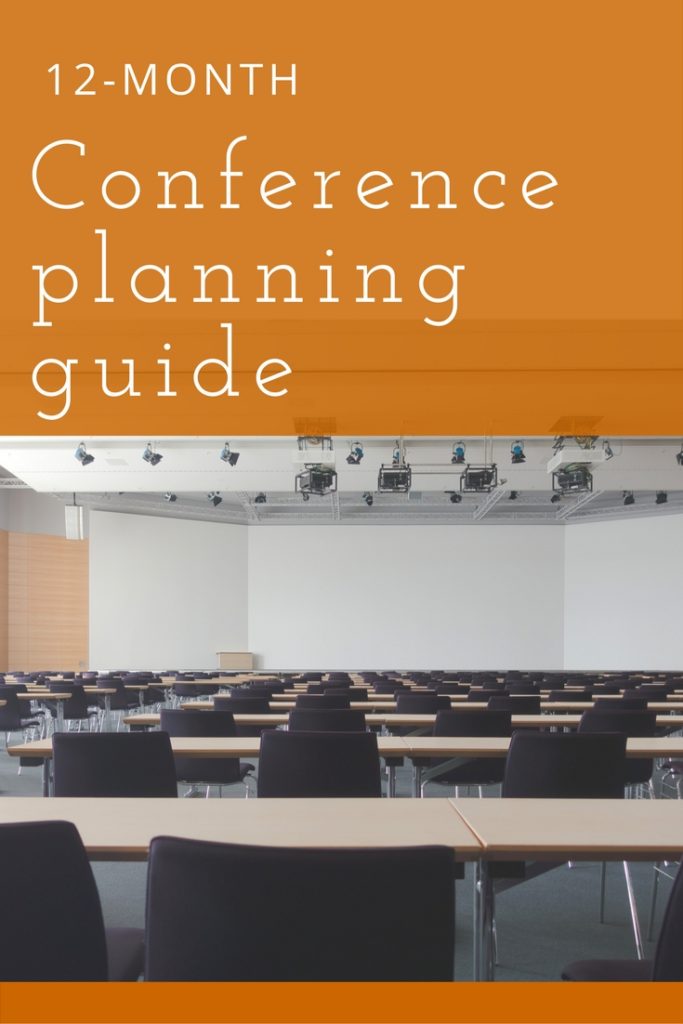
Not all events are created equal—that’s something you’ll hear us say again and again. What’s one of the things that will set your event apart? Adequate planning is the key! Give your speakers, vendors, and guests ample lead time to save the date, and give yourself plenty of lead time so you’re not rushing with last-minute details.
When the event is 12 months away…
It might seem overzealous, but you should start thinking about your conference at least a year in advance. This will give you plenty of time to choose a topic, determine your budget, and make all the necessary preparation.
Questions to ask: What will the conference be about? What is the target audience and demographic? How do those two align with the budget?
When the event is 10 months away…
Once you have the general plan and budget laid out, you can start to tackle the details. Assess your budget and ideal audience, and see what venues in the area will meet those needs. You want to have a date and venue secured in plenty of time to book a speaker and advertise.
Questions to ask: Does the venue align with the audiences’ interest? Is it large enough for the number of invites? What date(s) are best for the event, and is there any flexibility?
When the event is 8 months away…
Now it’s time to figure out who will be speaking or presenting at your conference. If you need an external expert, be sure to ask them in plenty of lead time—we recommend no less than six months. Also start to think about anything you will need during the conference—food, handouts, water, parking. Your venue might offer some of these, but if not, you’ll need to plan around that.
Questions to ask: Who do I want to speak? What does the speaker need ahead of time for the event? Does the speaker need accommodations for the night, or transportation to or from an airport? Will I provide food? What about take-aways or tchotchkes?

When the event is 6 months away…
Advertise, advertise, advertise! By the six month mark, any websites, promotional material, or style guides should be established for you to hit the ground running when your speaker says Yes! Don’t let small details like sign-in sheets or water for presenters get lost in the shuffle—triple check your list to make sure you’re moving forward with everything at the same pace.
Questions to ask: Where can I advertise to attract a wide audience? Will guests want individual, personal invitations—or will an email suffice? What is the marketing budget?
When the event is 4 months away…
At this point, your speaker is confirmed, you have your venue chosen, and you’ve reached out to caterers for food. Now it’s time to check-in and see where your attendance is at, and if you need to adjust any strategies. Maybe you’ve reached capacity and need to close ticketing, or perhaps you need to expand your audience to attract more numbers—now is the time to do so.
Questions to ask: Do I need to target a different demographic? Did I order enough food for everyone?
When the event is 2 months away…
The good news is, if you’ve been keeping track of your to-do list—both big and small—the last few weeks are more watching your hard work fall into place, and less execution. Double-check catering details, and work on any handouts or in-conference materials you want.
Questions to ask: Do I have all handouts and paperwork prepared? Were there any last-minute details I forgot, like scheduling a sound test the morning before, or confirming there’s a way to get the PowerPoint on the projector screen?
When the event is 1 month away…
Somewhere in the last month, confirm with your speaker and any third party vendors or groups that the dates and times are all correct. Be sure to communicate if anyone needs to be there early, or will have to stay late. Don’t forget to remind attendees, too. A few email reminders in the weeks leading up to the conference will keep it fresh on their mind.
Questions to ask: Do I have confirmations from all involved parties? Are there enough guests to move forward with the event? Have the guests been properly reminded?
In Conclusion…
No matter how you look at it, planning pays off in the end. This guide will help you for the 12 months leading up to your event. Keep in mind that, while there is a science to planning the perfect conference, there’s isn’t a one-size-fits-all equation for it. Don’t forget to do your research and pre-event planning beforehand to make sure there aren’t wild cards specific to your location or event that would require additional time.
For example, if you want to ask a celebrity to be the keynote, you’re going to need more than eight months lead time. But if you don’t need an external expert at all—if your colleagues will take turns presenting—you may be able to shave a few months off your overall timeline.
BONUS TIP! Deliver or mail post-event handwritten thank you cards to your speaker and anyone who helped you plan or execute the event. Appreciation goes a long way!


